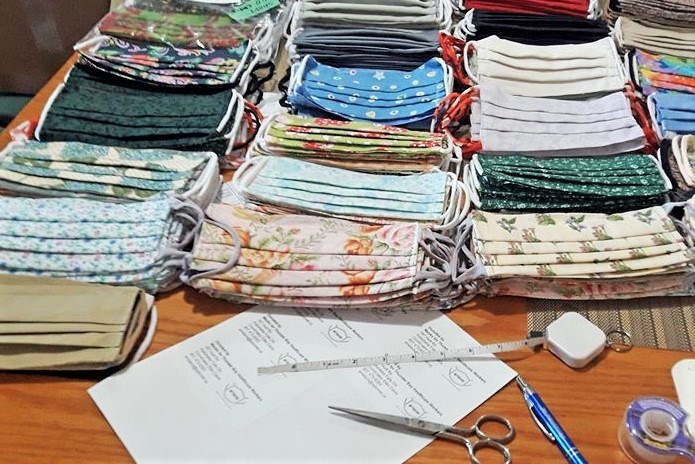THUNDER BAY – In the early days of the COVID-19 crisis, Ellen Davis contacted some friends from a Conmee-area sewing group with an ambitious goal: to make 1,500 cloth masks for local health care workers.
Fast forward a few months, and that effort – dubbed simply Masks for Thunder Bay Healthcare Workers – has bloomed into a network of volunteer sewers, cutter, and drivers who continue to deliver masks by the thousands to health workers in a variety of fields.
The team recently quadrupled Davis’s original target, surpassing a total of 6,000 masks produced last week.
“We definitely have come a long way – it’s blown way [past] what my original expectations were,” Davis says. “The need is just so great. We thought it would slow down, but because the public health care system is now opening up, they’re requiring more masks.”
While the group has studied recommendations on cloth masks from health authorities like the WHO, Davis is careful to note the product of their efforts are not official personal protective equipment (PPE). In healthcare settings, they’re more often worn over top of approved PPE to extend its life, or in lower risk environments outside of patient care.
“They’re to protect other people from what you’re breathing out,” she explains. “The cloth face masks, even with filters in them, are not PPE – we can’t say they’ll protect you from the virus, but they’ll protect others. And if everybody wears them, it protects the community from spreading it.”
Agencies that have received masks include Chartwell, Bayshore Home Healthcare, the Northwest Community Health Centre, a number of clinics, and some First Nations health agencies.
The group also recently began making windowed masks for use by speech therapists, whose clients often rely on lip reading cues.
While she looks forward to the day the group’s efforts will no longer be necessary, Davis doesn’t begrudge the health system’s need for help from community volunteers.
“I don’t think anybody could have been prepared for [COVID-19],” she says. “We still don’t understand completely how the virus is spreading and how to protect ourselves from it.”
The spike in demand for PPE, along with restrictions on exports of from other countries, pose an ongoing challenge for health agencies, she said.
Davis, who has a background in the home health care field, has been amazed at the response from the rotating team of volunteers behind the effort. The group produces between 200 and 500 masks per week, she says, using mostly donated materials – though members have paid for some supplies out of pocket.
The reopening of Ontario workplaces has put some strain on the group’s capacity, as members begin returning to work.
“We’re constantly looking for volunteers, because the time they can give to us is shrinking,” Davis says. “People going back to work are finding the time demands for their jobs are higher, because things are different.”
Davis doesn’t see the need for the group’s efforts declining anytime soon, and hopes they’ll be able to recruit enough volunteers to continue until a vaccine is developed.
“Our biggest hope is that they find a vaccine - that’s really what the end of this is going to be,” she says. “But there’s also the possibility we run out of volunteers and supplies. I hope that doesn’t happen, but if it does, we can’t go on.”
Those interested in volunteering (those with sewing machines are particularly needed) or donating sewing material or money can contact the group through their Facebook page.
